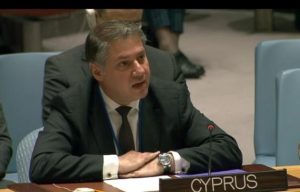Open Debate Under the Theme “Protection of Civilians in Armed Conflict, Including Healthcare in Conflict”
Security Council, 25 May 2017
Mr President,
At the outset, allow me to commend you for organizing this open debate on the always pertinent issue of the “Protection of civilians in armed conflict, including healthcare in conflict”. Cyprus subscribes to the statement delivered by the European Union and would like to add the following in its national capacity.
The Charter of the United Nations puts the people at the vanguard of this organizations purpose and mission. “We the peoples of the United Nations determined to save successive generations from the scourge of war” is a creed by the people, for the people. A peaceful and safe world is the principal yardstick of our failure or success.
Civilians are the primary victims in most of today’s armed conflicts. They are being indiscriminately killed or injured and often deliberately targeted with complete impunity. Data indicates that more than 90 per cent of those killed or injured in populated areas are civilians. Beyond human loss the consequences extent to the separation of families, the destruction of communities and livelihoods, the extinction of cultural heritage, the deprivation of education and healthcare, displacement and alienation of peoples from their ancestral lands and the continuous migratory outpouring in search of shelter and a safe future. It is extremely alarming that more than 2,500 targeted attacks had been carried out in the last four years against patients and health-care workers.
Echoing the need for urgent action, Cyprus co-sponsored resolution 2286 (2016), by which the SC strongly condemned attacks on medical personnel in conflict situations today, it deplored the long-term consequences of such attacks for the civilian populations and health-care systems of the countries concerned and demanded an end to impunity for those responsible and respect for international law on the part of all warring parties.
Mr President,
The protection of civilians must be at the core of the Security Council’s agenda, not only in connection to peacekeeping missions explicitly mandated for the protection of civilians but as integral part of a comprehensive approach encompassing all aspects related to prevention, peacekeeping and peacebuilding and the promotion of international peace and security. Cyprus endorses the concept of modern multidimensional and multipurpose peacekeeping missions, encircling the whole spectrum of peacebuilding activities, from contributing to the return to normal conditions and thus providing secure environments, to monitoring human rights including health and educational rights and facilitating the implementation of peace agreements.
Through this perspective of moving beyond the traditional concept of peacekeeping we are of the view that the Security Council must intensify and particularize its expectations and monitoring of the implementation of peacekeeping mandates in the field of the protection of civilians. In other words, the protection of civilians in conflict should not be merely seen as a duty deriving from explicit peacekeeping mandates but as a mission wide task spilling over the whole spectrum of peacekeeping operations in a specific context.
Mr. President,
Let me give one example from a peacekeeping mission – UNFICYP hosted in my country for the last 53 years – not explicitly mandated for the protection of civilians, however, performing important tasks in this field.
Despite an agreement that was reached in Vienna on 2 August 1975 which was never honoured by the Turkish side, the Turkish side undertook to give the enclaved population “every help to lead a normal life, including facilities for education and for the practice of their religion, as well as medical care by their own doctors and freedom of movement in the north.”
In practice the Cypriot enclaved were subjected to constant harassment. Their living conditions since July 1974 and despite the aforementioned agreement, can be demonstrated by a simple recount of their numbers. In July 1974 after more than 160,000 Cypriots were forced to flee their ancestral land, a significant number amounting to 20,000 have remained enclaved in the occupied part of the country. In 43 years since 1974 this number has diminished from 20,000 to only 403, after being subjected to constant harassment, including physical assaults, restrictions to their movement, denial of access to adequate medical care, denial of adequate educational facilities especially beyond the elementary school level, censorship of school books, curtailment of their right to use and bequeath their immovable property and curtailment of freedom of worship in their churches and monasteries.
Though due to the help of UNFICYP’s the Turkish side allowed certain minor improvements in the lives of the enclaved, their living conditions remain deplorable and unchanged. This conclusion is fully in accord with the findings of the European Commission of Human Rights and the judgment of 10 May 2001 of the European Court of Human Rights, which examined the plight of the enclaved as part of the Fourth Interstate Application of Cyprus against Turkey.
Mr. President,
The report of the High-Level Independent Panel on UN Peace Operations (HIPPO), released in 2015, observed a growing gap between what is expected of peace operations and what they deliver, particularly recognizing this gap in its comments on the protection of civilians. This shortcoming is to a large extent a result of the gap in many missions between resources and mandates, yet another pertinent issue in the light of ongoing discussions on the financing of peacekeeping operations. Fewer resources amounts to fewer capabilities especially to the detriment of the most sensitive aspects of peacekeeping.
Mr. President,
The United Nations will be an effective and credible organization to the extent that it strengthens its ability to respond to the needs of the people in hardship. This is the core purpose of its creation and a fundamental challenge to which we should collectively rise.